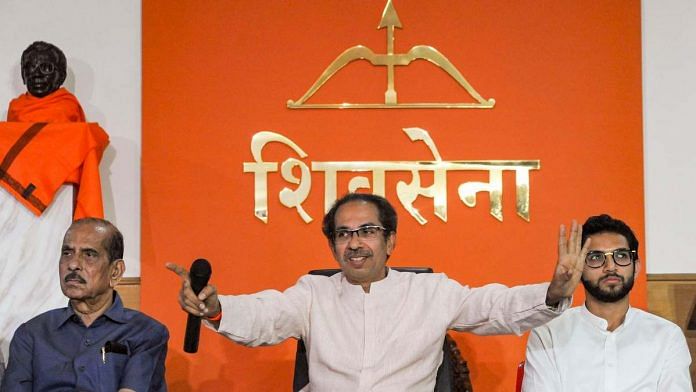New Delhi: Shiv Sena chief Uddhav Thackeray, who is set to be sworn in Thursday as the first Thackeray chief minister of Maharashtra, had got rather poetic when he weighed in on the collapse of the party’s alliance with the BJP in 2014.
In a 2014 interview with ThePrint’s Editor-in-Chief Shekhar Gupta on NDTV‘s Walk the Talk, Thackeray had said “Yeh kya hua, kaise hua, kyu hua, kab hua”, quoting the Bollywood classic from Rajesh Khanna-starrer Amar Prem.
A Bollywood analogy ensued as Thackeray sought to explain how the BJP and the Shiv Sena’s “Amar Prem (eternal love)” became “Kati Patang (a fallen kite)”.
The 2014 assembly election in Maharashtra played out much the same way as this year’s, except for the fact that the BJP-Shiv Sena’s alliance ‘Mahayuti’ had split before the polls.
The BJP emerged as the single-largest party in the election, but without a majority. The Nationalist Congress Party (NCP) subsequently offered outside support despite being a rival. However, by December, the Shiv Sena was back with its ally and in government. This interview predates the reconciliation.
Also Read: Hotels are the winners in Maharashtra and Uddhav Thackeray is the new common man?
2014 and 2019
The BJP and the Shiv Sena have been allies for over three decades, joining hands in 1989, nine years after the former came into being. It was an alliance driven by political compulsions, Thackeray said in the interview.
“It was born so as to not split the Hindu vote. This is not the first time there have been disagreements between us,” he added. “But this is the first time it got so bad.”
“No one is happy with what has happened, not me, not any Maharashtrian, nor any Hindu from across the country,” he said. “Although me and my party tried our level best, we never thought that the Mahayuti will break.”
Then, as now, the alliance collapsed over the demand for equal distribution of power between the two allies. While it was the Shiv Sena seeking a 50:50 distribution this year, the demand came from the BJP in 2014.
It is to be noted here that the 2019 assembly elections marked the first time in 30 years that the Shiv Sena agreed to take a lesser role in the alliance.
“We were asked to let go of 34 seats to ensure a 50-50 power sharing. Why should we do that?” Thackeray had said back then. “Has my party not worked? The Shiv Sainiks are extremely dear to me… BJP’s demand from Shiv Sena was like political recession.”
Thackeray then noted how the death of his father and party founder Bal Thackeray in 2012, and BJP leaders Pramod Mahajan and Gopinath Munde in 2006 and 2014, respectively, left the two parties without a bridge.
“After the passing of Balasaheb Thackeray, Pramod Mahajan and Gopinath Munde, the bridge that connected the BJP and Shiv Sena collapsed,” he had said.
“For the first time, someone from Delhi came when there were differences and our 25-year-old alliance broke,” he added.
‘Doublespeak on youth’
Thackeray had criticised the BJP’s stated push for youth and described how the party allegedly made light of his son Aaditya Thackeray’s presence during seat-sharing negotiations in 2014. Aaditya, who contested and won his maiden election this year, was 24 at the time.
“When negotiation was going on right before the alliance broke, the BJP refused to come to Matoshree [the Thackeray residence],” he said. “So, I sent some senior leaders from my party along with my son, Aaditya Thackeray, so they don’t think I ignored them. It was a symbolic move that a Thackeray has come to you.”
However, Thackeray’s young age, he said, “seemed of more importance to them”.
“Their dismissal of Aaditya exposed their doublespeak for and about the youth,” Thackeray added.
“I don’t want to make a statement on whether the BJP became arrogant or greedy,” he said. “What has happened has happened in front of everyone.”
He also addressed allegations that the fight over seats resulted from a longer endgame that the Sena had in mind.
“Whether I wanted to be CM or not is irrelevant. Fact of the matter is, I am the party chief, I will always want my party to remain ahead,” Thackeray added.
“However, if given the opportunity to become chief minister, I will accept it,” he said.
Ending the conversation on a dramatic note, Thackeray said, “This is Maharashtra, not Dhritrashtra. We are not blind. You cannot separate Balasaheb from Maharashtra. His effect remains till today.”
Also Read: How Uddhav Thackeray shed his Rahul Gandhi image to be a Shiv Sena leader in his own right




I think here is what is going to happen. Shiv Sena will have to move away from its hindutva ideology in order to keep Congress and NCP on its side; as a result, its hindutva base will migrate to BJP. NCP will be the puppetmaster and will gain its influence in the state. So, BJP and NCP will be primary beneficiaries going forward. It is more or less neutral for Congress. Shiv Sena will be the biggest loser.